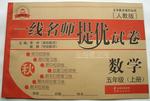题目内容
It was _____ terrible earthquake and ______ number of people who were killed reached more than 20,000.
| A.a; the | B.the; a | C.the; the | D.a; a |
A
解析试题分析:考查冠词,,包括定冠词the和不定冠词a/an,第一个空表示一个可怕的地震,所以用不定冠词,第二个空固定词组,表示…的数量,句子意思“一个可怕的地震死亡人数多于2000人”,所以选A
考点:考查冠词
点评:冠词是高考常考内容,做有关冠词的题型可以从两方面入手,一是习惯搭配,二是固定短语。对于固定短语平时应多读多记
即学即练:Mr.Bill Clinton was elected ____ President of the United States in ____ 1990s.
A.the; the B.a; the C.the; 不填 D.不填; the
选D

练习册系列答案
 一线名师提优试卷系列答案
一线名师提优试卷系列答案
相关题目
--- Did Jack come back early last night?
--- Yes. It was not yet eight o’clock ______ he arrived home.
| A.before | B.until | C.when | D.af ter |
| 完形填空。 | ||||
| A boy was walking home from school when he saw a large, tempting (诱人的) apple on one of the branches of an apple tree hanging out over a tall fence. The boy wasn't much of a fruit-eater, 1 a bar of chocolate if given the choice, 2 , as they say, the forbidden fruit can be tempting. Seeing the apple, the boy wanted it. The more he looked at it, the 3 he felt and the more he wanted that apple. 4 as high as he could, but even as his tallest 5 he was unable to touch It. He began to 6 up and down, as high as he could, at the 7 of each jump stretching his arms to get the apple. Still it remained out of 8 . Not giving up, he though, if only he had something to 9 on. His school bag wouldn't give enough height and he didn't want to 10 the things inside, like his lunch box, pencil case, and Gameboy. Looking 11 , he hoped he might find an old box, a rock, or, 12 luck, even a ladder, but it was a tidy neighborhood and there was nothing he could use. He had tired everything he could think to do. 13 seeing any other choices, he gave up and started to walk 14 . At first he felt angry and disappointed thinking about how hungry he had become from his 15 , and how he really wanted that apple. The more he 16 like this, the more unhappy he became. 17 , the boy of our story was a preetty smart guy,even if he cloudn't always get what get he wanted. He started to say to himself. This isn't 18 , I don't have the apple and I'm feeling miserable as well. There's 19 more Ican do to get the apple-that is unchangeable-but we are supposed to be able to 20 our feelings. If that's the case, what can I do to feel better? | ||||
|